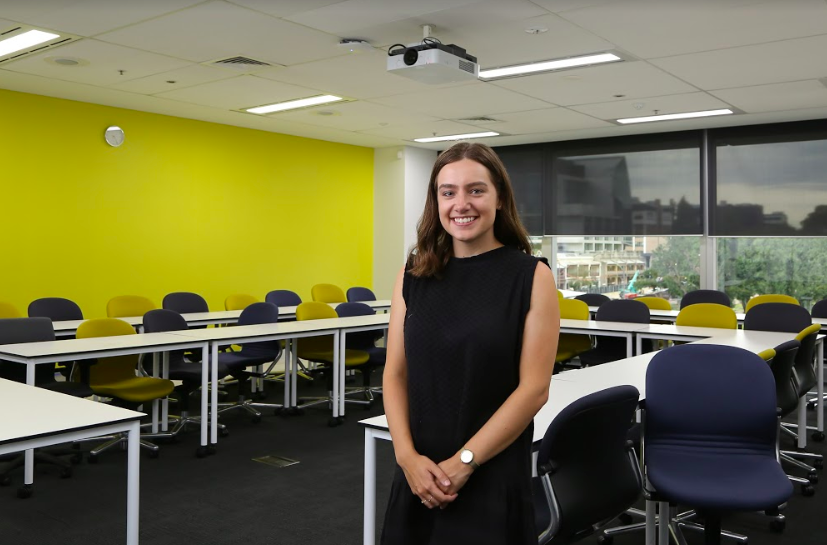|
Special Issue: Melbourne University Law Students' Society Elections Issue 7, Semester 2 Finishing the year as the LSS Internal Competitions Director, presidential hopeful Sarah Watling’s campaign is infused with a deep appreciation for the culture of the MLS and the profound sense of place that it brings to the lives of students. When talking to her, I mention that the one word that consistently springs to mind summarising her approach to the LSS would be ‘community’. “I would agree with that,” she states. She recounts her memory as a first year of interacting with then-president Gus Viola, and the impact that senior LSS members had on welcoming and making her feel a sense of belonging. “I would want to be that for incoming first years… I think my three strategic priorities all feed into the idea of having a stronger community at MLS, and that’s important because law school brings a lot of stresses… these are things we’re all going through and I think banding together makes it easier to get through this.” Watling’s leadership pedigree stems from her directorship over the LSS’s largest portfolio by Co-Opt size, leading a team of twenty committee members alongside her Co-Director Pia Mitchell. Talking about these experiences, she emphasises the importance of allowing autonomy in her leadership style, an approach she hopes to bring to the role of LSS president. Her vision for the society is to instead implement a raft of broader strategic initiatives aimed at enhancing student experiences and engagement.
Topping her list of policies, Watling hopes to break down financial barriers to the LSS, spearheaded, amongst other initiatives, by subsidized event ticketing. A necessarily complex policy, in the short-term Watling sees opportunities for lowering the cost of events based on an extensive review of the LSS’ financial position in recent years, and the availability of surplus funds. Although she clarifies that such an approach would not be long-term solution, she emphasizes the immediate possibility of providing financial relief for event prices in 2020. Beyond this, she envisions a permanent subsidized ticketing system as being possible to implement for those in financial need. Whilst wishing to avoid the LSS directly assessing the financial status of its members, she points to the MLS Book Fairy system – subsidies for textbook and reading materials for financially eligible students as assessed by the university scholarship office – as a possible blueprint, whilst also highlighting the need for further review of those systems as well. “… students have raised issues with the Book Fairy initiative in terms of qualifying, so I would work with the ESJ (Equity and Social Justice) portfolio and MLS faculty next year to see if those issues can be ironed out too.” Next to plans for financial reforms, Watling’s campaign also centres on holistic efforts to foster more involvement. Throughout the interview, Watling emphasises a ground-up philosophy she would bring to the presidency – with policy initiatives aimed both at fostering greater collaboration and pooling communication channels between the LSS and other MLS student groups; as well as implementing formal systems for students to present ideas and receive support for independently-led initiatives. “I think the creation of new societies such as Sports Law Association, Lawyers without Borders, and FAME LSA (Film, Art, Media and Entertainment Law Students’ Association), has shown that students want more diverse opportunities that fall outside the LSS’s current portfolios,” she states. “In terms of the ideas that people could bring – different panels that don’t necessarily fit into any of the current portfolios come to mind, but really, it could be anything that a student believes would benefit MLS students.” Whilst students currently have the ability to attend LSS meetings and pitch ideas to committee, Watling notes that historically students have been generally unaware of the opportunity to do so, envisioning instead a more codified system of involvement based around online portals to submit proposals and greater opportunities for involvement as special general meetings. Entering election week, Watling’s bid pledges a presidency based on a culture of shared support and comradery. “All students deserve to feel a part of a supportive community, and I want to ensure that students feel that they have someone they can talk to, that will hear their concerns, support them and celebrate their achievements.” For more on the 2020 Elections and to view candidate profiles, visit the MULSS website here. Voting is open from 9am Monday 9 September till 5pm Friday 13 September. Comments are closed.
|
Archives
October 2022
|



